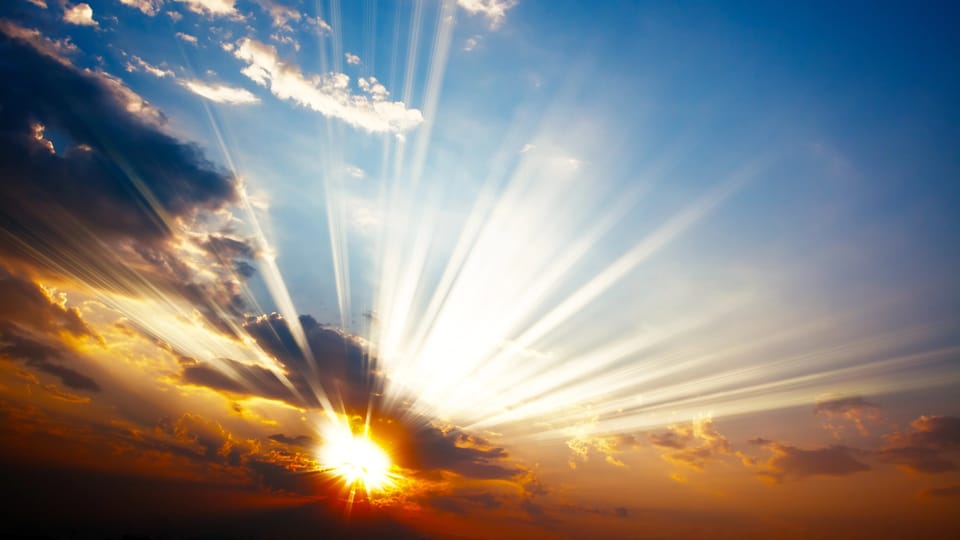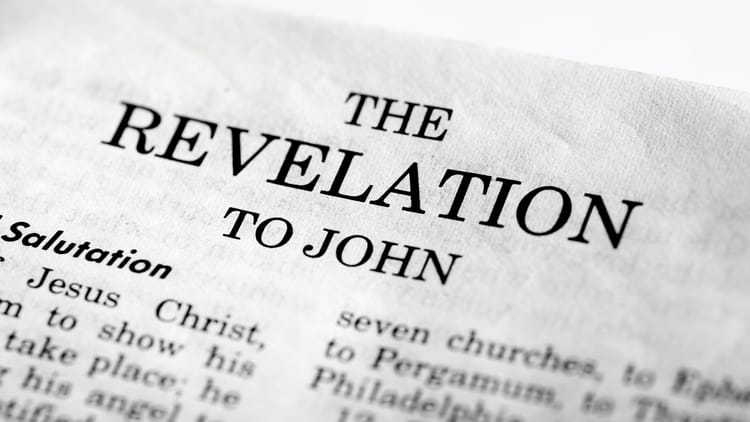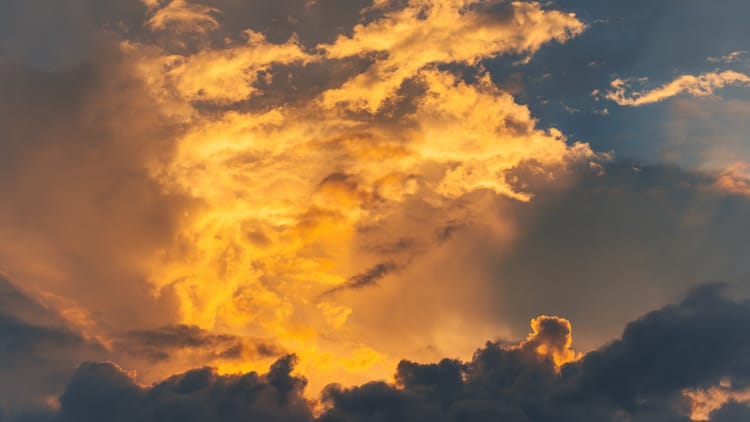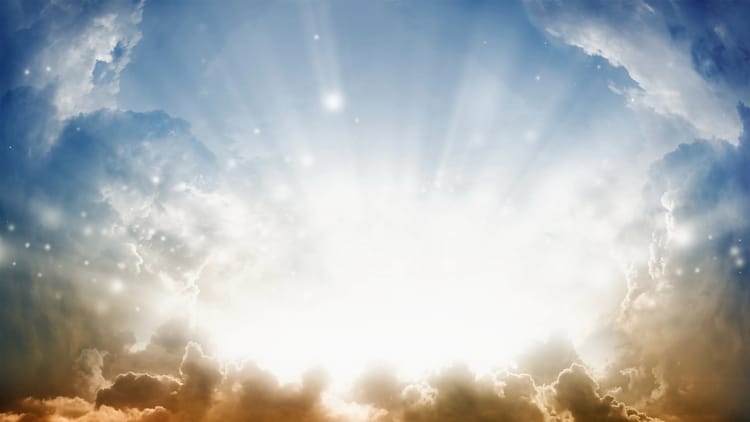Our Greatest Need (Revelation 4)

Big Idea: Our greatest need is to know God, love God, delight in God, and make much of God.
We have something in common, you and I. We want to know what truly matters in life. We aim to build our lives around something meaningful, something that will endure. We don't want to reach the end of our lives and realize we wasted them chasing things that don't matter.
But that's not all. We want the same for our kids. We want to steer them away from distractions and dangers. We hope they invest their lives in what really matters, maybe even more than we do ourselves. We want our kids to pursue what is most important.
Let me expand this vision further. As we begin a new year as a church, we need to focus on what matters most. It's easy for a church to get distracted by things that aren't important. This will only become harder as we face struggles, judgment, opposition, and obstacles.
So let me ask you: What will keep us focused on what matters most? What will keep our kids focused on what matters most? And what will keep our church focused on what matters most?
Well, this chapter of Revelation provides a clear answer. We need a vision of God who sits on his throne. And that’s exactly what this chapter gives us. This chapter gives us what you, your children, and our church needs most. This chapter gives us a vision of God who sits on his throne, and if we get this vision too, it could change our lives forever.
Revelation So Far
For the past few months, we've been studying the book of Revelation. Today, we're picking it up again after a break over Christmas. Revelation was written by John, the beloved disciple of Jesus, who also authored the Gospel of John and the three letters (1st, 2nd, and 3rd John). He wrote it in the mid-90s on the island of Patmos. It was addressed to a group of 1st-century churches in the Roman province of Asia, which is now called Turkey. However, it has a message for churches everywhere.
At the time this book was written, the church was small and outnumbered, while the Roman Empire was very powerful. In Revelation 1, we get a vision of Jesus Christ. It's like the curtains of heaven are pulled back, and we get a view of Jesus Christ, our exalted and conquering Lord.
And then in chapters 2 and 3, Jesus writes to seven churches, which represent churches in all times and all places. He has a message for these struggling churches. These churches have all kinds of strengths and struggles. He encourages them, confronts them with challenges, and calls them to be faithful.
A Vision of God
But now Revelation shifts. Jesus has spoken to his churches, but in chapter 4, John receives a second vision. And what is the vision that John receives? He receives a vision of God who sits on his throne.
It's a vision that continues into chapter 5. It's an adoration ceremony where John sees God in his glory. He witnesses the indescribable majesty and transcendent glory of God. Although John is in Patmos, he's transported to the throne room of heaven and gains a completely different perspective on what's happening in the world. Christians are not just a small minority; God rules from heaven, and his people are safe.
John catches a glimpse of God's majestic presence, and this changes everything. In many ways, what happens in chapter 4 is similar to what’s happened before:
- to what Moses witnessed in Exodus 34, when the Lord made his goodness pass before Moses and proclaimed his name to him;
- to what Isaiah saw in Isaiah 6 when he saw “the Lord sitting upon a throne, high and lifted up; and the train of his robe filled the temple”;
- to what Ezekiel saw in Ezekiel 1 when, while in Exile in Babylon, he says, “the heavens were opened, and I saw visions of God” (Ezekiel 1:1);
- or to what Daniel saw in Daniel 7:9 when “thrones were placed, and the Ancient of Days took his seat.”
What do all these appearances of the glory of God have in common? The answer is they all happened when things looked bleak. Moses saw God's glory when the covenant was in danger after the people had sinned. Isaiah saw God's glory during a time of political turmoil, when the king died, the nation was on decline, and powerful nations were rising. Ezekiel and Daniel both saw visions of God's glory while in exile. Now, John sees a vision of God's glory when the church is small and struggling, and he himself is in exile.
What do God's people need most when things look bleak? They need a vision of the glory and majesty of God. We’re not that different. As we’re struggling, as our lives unfold, the same realities that were true back then are true of us today, and we need these realities. As James Hamilton says:
You are surrounded by the glory of God. God is revealing himself in glory to you right now as we consider what chapters 4, 5 show us about the Creator and Redeemer. God reveals himself to you in his creation, which reflects his glory, and God reveals himself in a uniquely precise way in the Bible that he inspired. With the glory of God in creation all around you and with the Bible before you, you are surrounded by God’s glory. Drink it in and pray that God will set you free from the world’s idolatry, immorality, and godless way of interpreting life.
Revelation 4 shows us four things.
First, we see what’s happening right now.
After this I looked, and behold, a door standing open in heaven! And the first voice, which I had heard speaking to me like a trumpet, said, “Come up here, and I will show you what must take place after this.” (4:1)
This vision takes place while John is in Patmos. While he's in exile, he gets a picture of what's going on at that very moment in heaven. He gets a glimpse of what’s really going on in the world despite all appearances to the contrary. While on a rocky island in the Mediterranean Sea, Jesus pulls back the curtain, opens a door, and gives John a picture of what’s happening right now.
Second, we see a glimpse of God’s glory.
“At once I was in the Spirit, and behold, a throne stood in heaven, with one seated on the throne” (4:2).
John sees two things: a throne standing in heaven and someone sitting on it. The throne represents the place from which the whole universe is ruled. Right away, we're comforted. Sometimes it looks like the throne of the universe is unoccupied, that things are in complete chaos.
Someone has said it often feels like headquarters is vacant, that there's nobody in control, and that the powers of chaos, evil, and death are in charge. But John sees there is a throne. There is a place of power and authority over the entire universe. And it's not in Rome. The emperor's not sitting on it. The throne is in heaven.
Heaven is the place of authority and power. But even better, we then read that there is someone sitting on the throne. Like Ezekiel in Ezekiel 1:26 or Isaiah in Isaiah 6, we get a glimpse that there is someone on the throne, someone who looks like a human being seated on it. And it's good news indeed for all of us. Heaven’s throne isn’t vacant. No power in this world is ultimately in charge. Someone much better is ruling over heaven and earth.
But in verse 3, we don't get details of who is sitting on the throne right away. Instead, we see images of precious and beautiful gems. Why mention all these gems? Because they show the impressive value and beauty of what they describe.
The one seated on the throne is surrounded by precious stones and the halo of a rainbow. It brings to mind the vision of Ezekiel 1:26-28:
And above the expanse over their heads there was the likeness of a throne, in appearance like sapphire; and seated above the likeness of a throne was a likeness with a human appearance. And upward from what had the appearance of his waist I saw as it were gleaming metal, like the appearance of fire enclosed all around. And downward from what had the appearance of his waist I saw as it were the appearance of fire, and there was brightness around him. Like the appearance of the bow that is in the cloud on the day of rain, so was the appearance of the brightness all around.
You get the sense that John has no words to describe the indescribable glory of God. He gives us an indirect vision of God.
God is so sovereign and beautiful as he sits on his throne that we get hints of his beauty and glory. This vision shows us that God, who reigns over all, is inexpressibly glorious and beautiful. The throne is filled with beauty, transcendence, and the magnificent glory of God.
Third, we see that God surrounded by heavenly beings.
Around the throne were twenty-four thrones, and seated on the thrones were twenty-four elders, clothed in white garments, with golden crowns on their heads. From the throne came flashes of lightning, and rumblings and peals of thunder, and before the throne were burning seven torches of fire, which are the seven spirits of God, and before the throne there was as it were a sea of glass, like crystal.
And around the throne, on each side of the throne, are four living creatures, full of eyes in front and behind: the first living creature like a lion, the second living creature like an ox, the third living creature with the face of a man, and the fourth living creature like an eagle in flight. And the four living creatures, each of them with six wings, are full of eyes all around and within, and day and night… (4:4-8)
in verses four to seven. Twenty-four elders occupy thrones around God's throne, and they continually praise God and the Lamb. They wear white garments, symbolizing purity and holiness. Their golden crowns show their high status.
John doesn't tell us who they are, and there are many interpretations about them. We don't know if they're angelic or human. We can't be sure if they represent Old Testament saints (the twelve tribes of Israel) plus New Testament saints (the twelve apostles) — the entirety of God’s people from all ages. John describes them but doesn't specify their identity. It's possible they are heavenly beings representing God's people, part of God's heavenly army.
In verses five and six, we see flashes of lightning, rumblings, peals of thunder, and fiery torches, reminding us of God’s awesome presence at Mount Sinai. There is something like a glass sea—a gleaming translucent floor stretching out in front of God's throne. It's an amazing picture.
Then in verses six and seven, we see four living creatures covered with eyes in front and back. This image comes from Ezekiel 1. They form the innermost circle around God himself. They surround God, offering worship and service to him, guarding his purity and holiness. It's an astounding picture.
We see God in all his glory, surrounded by heavenly beings, all within a context of indescribable glory.
But then we that God is worthy of worship.
They praise God for two things. In verse 8, they praise God for his holiness.
“Holy, holy, holy, is the Lord God Almighty,
who was and is and is to come!”
And in verse 11, they praise him for His creation of all things.
Worthy are you, our Lord and God,
to receive glory and honor and power,
for you created all things,
and by your will they existed and were created.”
Why is God worthy of being praised? Because He is holy, holy, holy. This threefold repetition drives home His uniqueness. There's nobody like him. He's incomparable. He is the eternal, self-existent One who controls history from beginning to end. He is the One revealed in Isaiah 6:2-3. He is the glorious, omnipotent, eternal God.
But that's not all. He's also the creator of all things. The God we worship is the God who made everything. It is only right for us as creatures to offer our praise to God because everything was made by Him. Creatures who are utterly dependent on God's gifts must bow before our Creator's praise.
And so it's only right in verse 10 that the 24 elders fall down before Him who is seated on the throne and worship Him, casting down their crowns before Him.
The vision we see in this passage is amazing. It looks like the world is out of control and hopeless, but John shows us what he sees. The throne in heaven is occupied by a great and glorious God in his majestic and transcendent beauty. He's attended by heavenly beings who witness to the grandeur of his kingdom. He's surrounded by crowns, light, rainbows, lightning, and thunder, which help us understand the immensity of his glory.
He is worshiped and adored because he has ultimate authority and control over all creation. He is worthy of our trust and devotion. He is worthy of our worship. He's glorious and beautiful beyond description and infinitely holy.
Why It Matters
What is the point of this vision? Why is Revelation chapter 4 so important for us? The reason is that it gives us a perspective we need but don't usually see. It's easy to build our lives around what we see with our eyes. It's easy to think the world is out of control and our lives are random. When things are hard, it's easy to stop believing in God and doubt if he's real.
Then Revelation 4 comes along and shows us what's really happening in this world. God occupies the throne of heaven. He is infinitely beautiful and glorious. He is the center of all creation and is worshiped by angelic beings. There is nobody like Him. Nobody deserves our allegiance or worship other than Him. There's nobody worth building our lives around other than him.
When we struggle or are tempted to build our lives around lesser things, this is the vision we need. Friends, what we need most is a picture of God in His glory on the throne. We need to see that the throne of heaven is occupied by one who is great and glorious, that things are not as they seem. There is one who is worthy of worship and praise, who was in charge of all history and is worth building our lives around.
We need a right view of God. We need to see Him in His majesty, sovereignty, and goodness above everything else that exists. We need to bow before Him in worship and understand that there's absolutely nobody like Him. When we see this, it changes everything. As Ian Hales says, “We need to look behind the heavenly curtain in order to persevere through the earthly chaos.”
Seeing God will change your life. When you see God as He is through John's eyes, you will realize that He's worthy of praise and worship. When you see Him, you will embrace His son, Jesus, who was slain and rose from the dead to save people from their sins and bring us into a relationship with this holy God. When you see God as He is, you will worship Him because He is worthy.
We have something in common, you and I. We want to know what truly matters in life. Revelation 4 shows us what really matters in life. We need a vision of God who sits on his throne. It will change our lives when we get a glimpse of the glory of God.
To paraphrase Kevin DeYoung, what we need most is a vision of the God who is holy, independent, and unlike us — a God who is good, just, full of wrath, and full of mercy. We need a vision of God who is sovereign, powerful, tender, and true. We need a vision of God with edges, an undiluted God who makes them feel cherished and safe, and small and uncomfortable too. We need a vision of God who works all things after the counsel of his will and for the glory of his name. Give them a God, whose love is lavish and free, who is worthy of wonder and fear, a God big enough for all our faith, hope, and love.
Do you have that? Our greatest need is to know God, love God, delight in God, and make much of God. See God in his glory. Come to him through his Son. And worship him!





